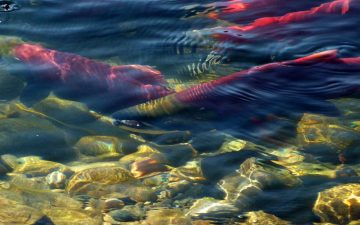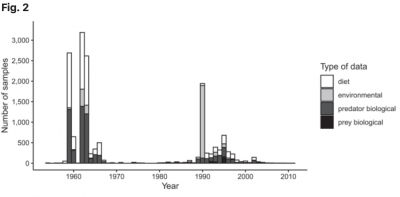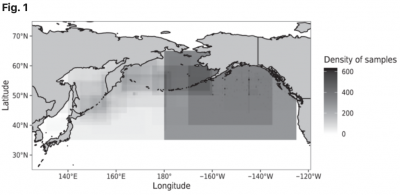By Riley Tjosvold

Sockeye salmon. / License: CC0 Public Domain
Developed as part of Project Salmon Resilience, a larger undertaking that aims to explore the impacts of fisheries and climate change on salmon populations, this database will fill gaps in scientists’ understanding of the late marine phase of the salmon life cycle, which is challenging to study at a large scale because of the long distances salmon swim from shore when they leave rivers and streams and enter the ocean.
“The diet database gives us a window into the lives of these salmon as they travel thousands of kilometres and experience different ecosystems and conditions,” said Caroline Graham, a graduate of the IOF’s Master of Science program who built the database as part of her Master’s thesis. “It’s about fitting the puzzle pieces together to see what conditions these fish face in the open ocean, and answering questions like: what food is available for them? is there competition for this food? how does this relate to environmental variability and salmon returns?”
Data for the database came from published, peer-reviewed studies and “grey” (non-peer reviewed) literature from countries across the North Pacific. Graham spent months combing through papers, extracting the data from them, and then translating the data into a standardized format that could be used to draw inferences about salmon, as well as be replicated for use in diet data collection for other fish species. To gather some data from places, such as Russia, the team had to negotiate with overseas agencies and hire translators to make sense of fish research and documentation. The work has already paid off by giving Graham some insights into salmon behaviour.
“What we’re seeing is that different species of salmon have different dietary habits. These differences tell us a lot about not only the ocean conditions but also competitive interactions between species of salmon, and how this plays out on a spatial scale,” Graham said.
Ultimately, the creators of the database hope that researchers collecting diet data on salmon in the North Pacific will add their findings to it, and that researchers studying Pacific salmon and North Pacific ecosystems more generally can use it in their work.
“One of the objectives for this project was to help bring the community together and hopefully inspire collating more data into this database,” said Brian Hunt, assistant professor and UBC Hakai professor of oceanography at the IOF who worked on the project.
He added: “There are a lot of other species of fish out there. We’d like to expand this database to more species and liberate diet data that are lurking in the literature or with agencies to make it available to the community. Everyone talks about ecosystem-based management, and to do that you really need to understand the interactions between animals. Most of that happens through the food web, so we need to provide access to information. Hopefully this is a small step in that direction.”
 The number of samples for each type of salmon data reported between 1950–2011. |
 The spatial distribution of salmon diet samples across the North Pacific Ocean. |
Graham, C., Pakhomov, E.A. & Hunt, B.P.V. A salmon diet database for the North Pacific Ocean. Sci Data 7, 332 (2020).
Tags: Brian Hunt, Evgeny Pakhomov, faculty, food webs, IOF students, Pacific, Pelagic Ecosystems Lab, Research, salmon, species distribution